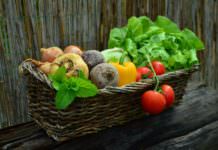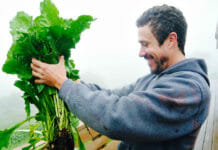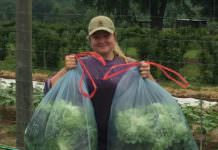
The average age of the American farmer is 57 years old and rising, according to the US Department of Agriculture. Meet Tricia Borneman and Tom Murtha, Bucks County farmers who are bucking this trend.
Borneman and Murtha run Blooming Glen Farm, a 35 acre farm in Blooming Glen, Upper Bucks County. It is primarily a community-supported agriculture farm (CSA), with over 300 members who purchase a share of the season’s harvest, picking up their produce from May through early November on a weekly or bi-weekly basis. The arrangement guarantees the farmer financial support and enables many smaller sustainable farms to stay in business. The benefit to the member? Fresh seasonal vegetables picked at the peak of ripeness and flavor.
 You’ll also see Borneman behind the counter at Blooming Glen Farm’s booth at the Wrightstown Farmers’ Market, selling the farm’s produce with both hands to a long line of customers.
You’ll also see Borneman behind the counter at Blooming Glen Farm’s booth at the Wrightstown Farmers’ Market, selling the farm’s produce with both hands to a long line of customers.
You can’t miss the stand. The shelves are filled with baskets, overflowing with vegetables, herbs and fruit. The bright, vibrant colors and delicious-looking product beckon. You won’t leave without buying something.
“We fell in love with the lifestyle of farming.”
Falling in love
Murtha and Borneman began the Blooming Glen Farm CSA in 2006 after working on other small, organic and sustainable farms for six years. They first met in Philadelphia where Borneman, a Bucks County native, was involved with urban farming. And they fell in love – with each other, and with growing. “We fell in love with the lifestyle of farming. It really spoke to us,” Borneman explains.
Back in 2000 it wasn’t easy to find an apprenticeship so they moved around to make the opportunities. They worked on an organic CSA farm in Connecticut, spent three years at an organic farm in Oregon, and a couple of years at a New Jersey farm and at Branch Creek Farm in Perkasie.
They learned not just how to grow vegetables using organic, sustainable practices, but how to market them and how to build a viable business. Finally they felt confident from all their experiences, and ready to start their own farm.
 Henry and Charlotte Rosenberger, owners of Tussock Sedge Farm in Blooming Glen, as well as 800 acres of preserved farmland, saw the promise in Murtha and Borneman. They leased them the land for the farm and have been strong supporters from the very beginning.
Henry and Charlotte Rosenberger, owners of Tussock Sedge Farm in Blooming Glen, as well as 800 acres of preserved farmland, saw the promise in Murtha and Borneman. They leased them the land for the farm and have been strong supporters from the very beginning.
Just recently, the couple signed a 20 year lease with the Rosenbergers, with an option to buy. Because of the cost of land in Bucks County, young farmers have difficulty owning land here. The new lease will give Borneman and Murtha some peace of mind, and the freedom to grow the business.
Meet with the couple and it is clear they are passionate about farming. “We pour all our energy into it and get so much back,” they say.
Borneman explains that every decision is considered carefully, every component of the business is poured over with an intentional process behind it. Whether it’s mapping out which vegetables will go where at the farmers’ market booth, or improving their management skills so that the farm runs smoothly and interns both learn and are productive, it’s all part of the plan.
“Nurturing healthy soil is directly connected to creating healthy people,”
Yes, it’s all about dirt
If you ask Murtha and Borneman about organic farming, get ready to hear about soil management. “Nurturing healthy soil is directly connected to creating healthy people,” explains Murtha.
Rather than add synthetic fertilizers to crops, the couple uses mulching, compost, lime, calcium, crop rotation and a regular sowing of cover crops, which all add nutrients back into the soil. The crops are also grown without pesticides, herbicides or genetically modified organisms.
Supermarket produce travels on average 1300 miles to reach the shelves. Much of it has been bred to travel long distances and look good upon arrival – not for taste or nutrition.
Whereas locally grown produce that you buy at the farmers’ market has a much shorter trip, often harvested that day or the day before. This retains more of the vegetables’ nutrients.

It also allows Borneman and Murtha to experiment with growing heirloom vegetables. These vegetables often do not travel well but they reward the eater with unique tastes, colors and shapes that have almost been lost in industrial agriculture’s goal to develop the “perfect” vegetable.
“My kid is 75% your food!”
“We feel we are really making a difference,” says Borneman. They hear their customers rave about the food they get from the farm. “My kid is 75% your food!” said one of their CSA members, whose 4 year old has been eating the farm’s vegetables since he was a baby.
It’s that kind of comment that gives deep satisfaction to Borneman and Murtha. “We are so grateful for all the support people have given us, buying from us and caring about healthy food.”
 As first generation farmers, they sometimes feel a little alone. “We’ve been trying to cultivate relationships with older farmers,” Murtha says. “We need to pick their brains and learn from them. How do we get from 40 years old to 60 years old? How do we manage the business for our financial stability and future?” These are issues that many farmers struggle with but especially these new, younger farmers.
As first generation farmers, they sometimes feel a little alone. “We’ve been trying to cultivate relationships with older farmers,” Murtha says. “We need to pick their brains and learn from them. How do we get from 40 years old to 60 years old? How do we manage the business for our financial stability and future?” These are issues that many farmers struggle with but especially these new, younger farmers.
“You can do all the right things, and then there’s nature.”
The couple also speaks about the other big challenge of farming – weather. As Murtha explains, farmers are on the front line of reality. “You can do all the right things, and then there’s nature.” It’s about acceptance and humility. “Some things you can control, and some things you can’t. You just have to accept it.”
Diversity and infrastructure
For now, the couple’s plans are clear. Continue to establish the business on firm ground by selling in a diversity of markets (CSA, farmers’ markets, and wholesale).
Build infrastructure like hoop houses and greenhouses that allow them to start the season earlier and grow later in the fall, providing more year-round produce for their customers and financial stability for themselves and their employees.
And become better managers of interns and apprentices so that they “grow” the next generation of farmers, as well as operate the farm efficiently.
You can find Blooming Glen Farm selling their produce at three farmers’ markets in Southeastern Pennsylvania – the Wrightstown Farmers’ Market in Wrightstown Township on Saturday mornings, the Easton Farmers’ Market in Easton, PA, also on Saturdays, and at the Headhouse Square Farmers’ Market in downtown Philadelphia on Sundays.
Find them online at www.BloomingGlenFarm.com.
Update: Blooming Glen Farm is now USDA certified organic.










![What we’re reading [Oct 16 2017]](https://www.buckscountytaste.com/wp-content/uploads/2017/10/coffee_macbook_reading_pexels-photo-414630-218x150.jpeg)

A new generation of Bucks County farmer http://t.co/nii9NP4hEj
RT @BCTaste: A new generation of Bucks County farmer http://t.co/nii9NP4hEj
RT @BCTaste: A new generation of Bucks County farmer http://t.co/nii9NP4hEj
@BCTaste @OnlyinBucks Love this! I grew up in Bucks. Great to see farms coming back. CSAs rule. #farmlove